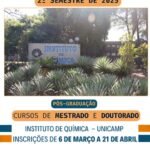Advancements and Applications of Low-Field Time-Domain Nuclear Magnetic Resonance: Insights from Molecular to Macroscopic Length Scales
Palestrante: Prof. Dr. Eduardo Ribeiro de Azevêdo (IFSC-USP)
Resumo: Over the past years, Time-Domain Nuclear Magnetic Resonance (TD-NMR) at low magnetic field has emerged as a versatile and widely used method for various applications. Primarily known for its utility in relaxometry, which involves the study of relaxation and diffusion processes to probe fluid properties, TD-NMR has found extensive use in fields ranging from materials science to the food, pharmaceutical and oil industries. However, recent advances in TD-NMR technology have expanded its scope far beyond traditional relaxometry. Among them are the application of 1H TDNMR in solid and soft materials, where the through-space magnetic dipolar coupling between the 1H nuclear spins plays a significant role, rendering the signals sensitive to molecular packing and mobility. In this seminar the discussion will focuses on the use of a class of 1H TDNMR experiments based on the 1H 1H dipolar interaction for investigating organic matter. We build upon dipolar echoes, dipolar filters, dipolar relaxation, and multiple quantum correlation experiments and demonstrating their effectiveness in evaluating molecular properties such as onset temperatures of molecular motions, crystallinity, and crosslink density in polymer, as well as to distinguish different polymorphic forms in solid pharmaceuticals. Additionally, we will show examples of 1H TDNMR applications for probing macroscopic phenomena such fertilizer dissolution in soils. Finally, we present progress progresses on the use of 1H Dipolar TDNMR as an alternative way for characterizing mesoporous structures.
Short CV: Eduardo Ribeiro de Azevêdo atua como Professor doutor no Instituto de Física de São Carlos – Universidade de São Paulo – IFSC/USP. Possui graduação em Física pela Universidade Federal de Goiás (1996), mestrado em Física pelo Instituto de Física de São Carlos – Universidade de São Paulo (1998) e doutorado em Física pelo Instituto de Física de São Carlos – Universidade de São Paulo (2001). Desde 2003 é professor doutor do Instituto de Física de São Carlos – Universidade de São Paulo – IFSC/USP. Durante sua carreira atuou no desenvolvimento de métodos de RMN e aplicações, no estudo de dinâmica molecular de polímero e proteínas, caracterização de solos e biomassas, estrutura de parede celular de plantas, informação quântica e sistemas quânticos abertos. Atualmente tem atuado principalmente nos seguintes temas: Métodos para RMN, materiais poliméricos e derivados e caracterização de matéria orgânica.
Youtube: https://www.youtube.com/live/IzSBrzecJ-A?si=xuUBrUiPM3Qqf3Si




